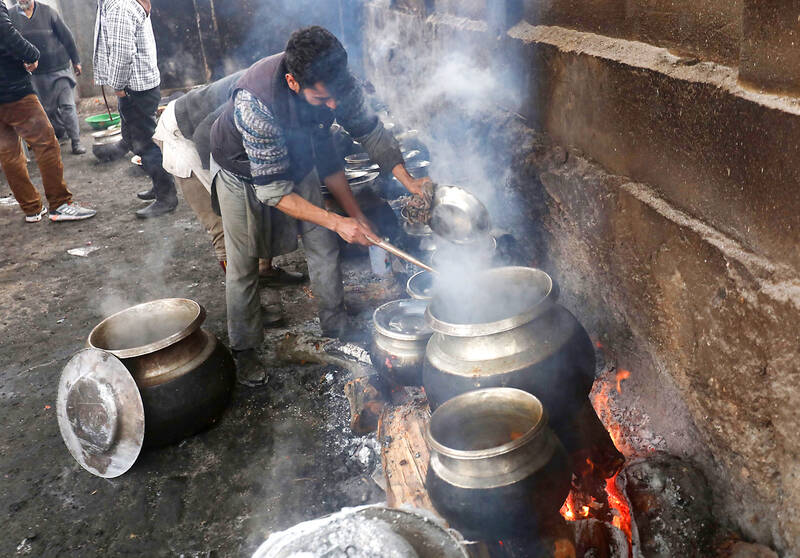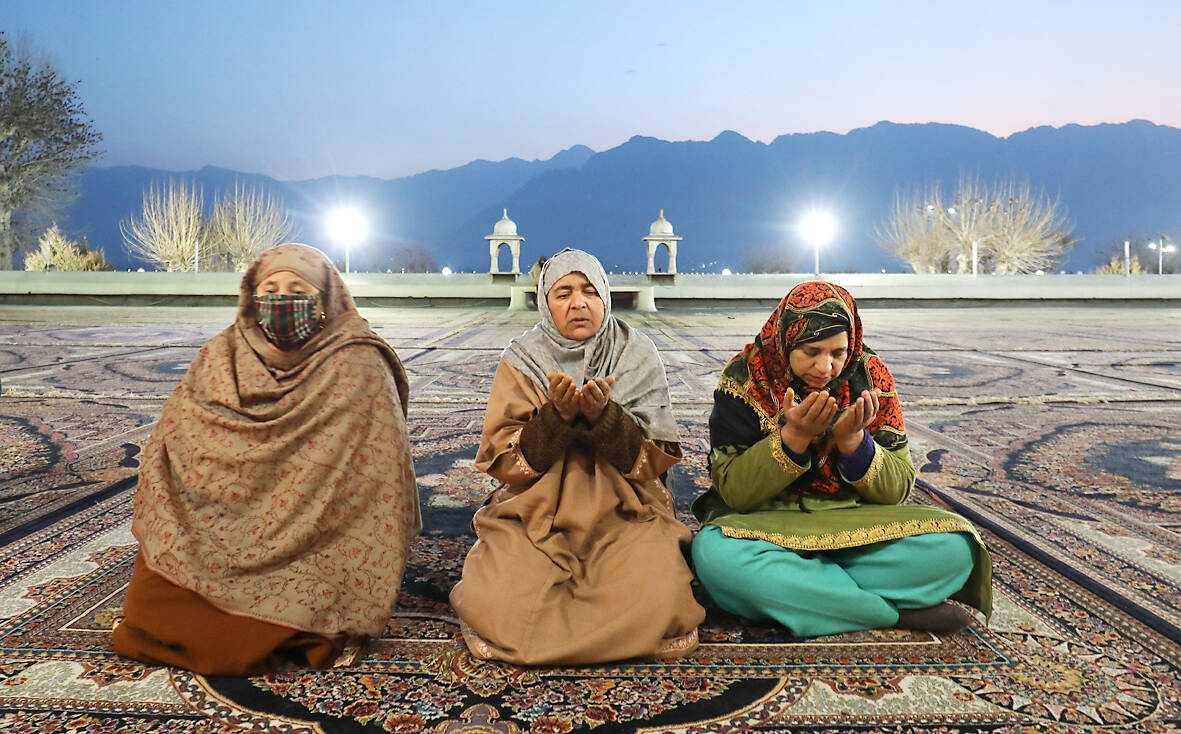On a bitterly cold morning near the banks of Jhelum River, Abdul Aziz Kozgar sits surrounded by the scent of roses, carrying the burden of legacy.
An ageing man with a trimmed white beard, Kozgar holds the poignant title of being the last maker of Arq-e-Gulab, or rosewater, in Kashmir.
His rosewater shop in the Khankah-e-Moula neighborhood in the old city of Kashmir’s main town Srinagar is a piece of history. Antique French and British bottles and jars are neatly placed on the shelves. The shop is as much rooted in the past as it is lost in the present.

Photo: EPE-EFE
Kozgar’s family has been making rosewater for two centuries, both as popular as a fragrance for the face and skin, but mostly to be sprinkled in the region’s famed mosques and shrines, where it has long played a traditional role in acts of devotion.
“Our ancestors used to make rosewater for religious functions. It had a spiritual purpose,” Kozgar says, referring to the ritual of sprinkling fragrant water during religious gatherings at shrines across Kashmir valley. The scent added to the mystique and amplified the experiences associated with these places.
The traditional business of making rosewater, however, is not lucrative and the competition is immense. “Rosewater available in the market is made by machines and ours is a completely manual process. We make it by process of condensation,” he said.

Photo: EPE-EFE
TIME-HONORED TRADITION
The technique by which Kozgar makes his rosewater has been passed down from fathers to sons in his family over the centuries. The distillation process begins with boiling rose petals in water and letting it vaporize, which is then condensed to form a fragrant liquid. The exact details of the process are a secret kept within the family.
The mountainous region of Indian-administered Kashmir is famed for its beauty but has long been a source of conflict between India and Pakistan, and in recent years has been ruptured by conflict and pro-Pakistan militancy. In 2019, the Indian government unilaterally took control of the region, stripping it of its statehood and autonomy, and placed it under a strict crackdown. It had a devastating impact on the local economy, particularly for the state’s traditional craftsman.
Kozgar can trace his ancestry and the art of making rosewater to the Turkic tribes of central Asia from where, nearly six hundred years ago, his forefathers left to travel to Kashmir, a Himalayan valley famed for its cold water streams, picturesque landscape, and moderate summers.
One of his forefathers was said to have been a disciple of Mir Syed Ali Hamdani, a Sufi saint from the 14th century. Hamdanis were revered Muslim preachers from central Asia who made various visits to Kashmir and deeply influenced the people here, leading to mass conversions from Hinduism to Islam.
They and their disciples are also credited with introducing various central Asian traditions, crafts, architecture and cultural influences in to Kashmir.
ENCHROACHING MODERNITY
Yet many such crafts, which were intricately done indoors by men as well as women, have now gone out of vogue as machine manufacturing and oversaturated global markets have made profitability difficult for artisans.
Zareef Ahmad Zareef, an octogenarian Kashmiri poet and cultural activist, remembers visiting the Kozgar shop when he was a child to purchase herbal medicines.
“I do remember going there and purchasing different herbal syrups that were effective against cold and cough. They were the only family in Kashmir who were trained in making different types of herbal syrups and scents … those days they were very busy and it was a place filled with people,” says Zareef.
Zareef described the Kozgar family as sort of medieval pharmacists, who manufactured dozens of types of herbal syrups which were then prescribed by hakeems, the Muslim physicians who specialized in Greek and Arabic medicine.
“There was a hakeem in every neighborhood of Kashmir and they used to treat diseases with these herbal syrups produced by Kozgars,” he says.
The introduction of modern medicines in the early part of last century made the traditional treatments irrelevant and Kozgars lost their importance in the region. As their business of herbal syrups slumped, Kozgars could only maintain one product – rosewater.
At his shop in the old city, Kozgar said he makes very little money out of rosewater. “The market rate is Rs 100 (US$1.2) per 100ml but I have kept the price minimal at Rs 50 (US$0.6) per liter because it is associated with the faith of people,” he says, adding “I am doing it to keep alive the tradition of my ancestors. I want to keep their memory alive.”
Kozgar, however, is uncertain if his family’s next generation would keep the shop and tradition going. “It is up to them, but it is difficult to survive on this,” he says.
Zareef, who has written poems on Kashmir’s cultural past and traditions, says the importance of Kozgars is now lost on younger generations. “They were once important people,” he says.
“They were the center of medicine and treatment. They used to make syrups and medicines using God’s own herbs,” Zareef says. “This shop is open for now but soon it will be like a museum.”

Last week saw the appearance of another odious screed full of lies from the People’s Republic of China (PRC) Ambassador to Australia, Xiao Qian (肖千), in the Financial Review, a major Australian paper. Xiao’s piece was presented without challenge or caveat. His “Seven truths on why Taiwan always will be China’s” presented a “greatest hits” of the litany of PRC falsehoods. This includes: Taiwan’s indigenous peoples were descended from the people of China 30,000 years ago; a “Chinese” imperial government administrated Taiwan in the 14th century; Koxinga, also known as Cheng Cheng-kung (鄭成功), “recovered” Taiwan for China; the Qing owned

In Taiwan’s politics the party chair is an extremely influential position. Typically this person is the presumed presidential candidate or serving president. In the last presidential election, two of the three candidates were also leaders of their party. Only one party chair race had been planned for this year, but with the Jan. 1 resignation by the currently indicted Ko Wen-je (柯文哲) of the Taiwan People’s Party (TPP) two parties are now in play. If a challenger to acting Chairman Huang Kuo-chang (黃國昌) appears we will examine that race in more depth. Currently their election is set for Feb. 15. EXTREMELY

Jan. 20 to Jan. 26 Taipei was in a jubilant, patriotic mood on the morning of Jan. 25, 1954. Flags hung outside shops and residences, people chanted anti-communist slogans and rousing music blared from loudspeakers. The occasion was the arrival of about 14,000 Chinese prisoners from the Korean War, who had elected to head to Taiwan instead of being repatriated to China. The majority landed in Keelung over three days and were paraded through the capital to great fanfare. Air Force planes dropped colorful flyers, one of which read, “You’re back, you’re finally back. You finally overcame the evil communist bandits and

They increasingly own everything from access to space to how we get news on Earth and now outgoing President Joe Biden warns America’s new breed of Donald Trump-allied oligarchs could gobble up US democracy itself. Biden used his farewell speech to the nation to deliver a shockingly dark message: that a nation which has always revered its entrepreneurs may now be at their mercy. “An oligarchy is taking shape in America of extreme wealth, power and influence that literally threatens our entire democracy, our basic rights and freedoms,” Biden said. He named no names, but his targets were clear: men like Elon Musk